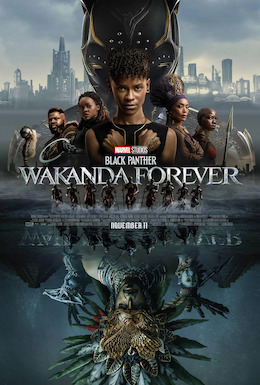It came as a shock to the world when the Black Panther himself, Chadwick Boseman, passed away in 2020 after years of battling colon cancer. It was an unprecedented situation where the lead of a mainstream superhero franchise died while still active in the role. In spite of the loss, Marvel moved forward with the Black Panther sequel and decided to lay the character of T'Challa to rest as well. Many have disagreed with this choice given superhero recastings of the past and normally I would agree that an actor shouldn't be bigger than their character. But this is different. One, this isn't some behind the scenes drama like with what happened with Terrence Howard and Edward Norton in their respective roles. Two, the first Black Panther movie was a cultural milestone with Boseman's performance being a key factor. And most importantly, it's too soon. There are people still grieving for Boseman's death, including the cast and crew of the first film, who returned for the sequel to both process their grief and honor their fallen friend. At this point, it would be cheap and disrespectful to swap another actor in. So will we ever see T'Challa in the MCU again? Well, the multiverse and variants are in play now, so there's certainly a chance. Right now, we have "Wakanda Forever", which acts as a powerful tribute to the past and a moving path to the future.
As much of the MCU post-Endgame has dealt with how one processes loss, "Wakanda Forever" probably has the most poignant portrayal due to the real world connotations. Much like Boseman, T'Challa's death is due to illness, which is respectful to the actor's memory and shows that a hero's death can be the normal kind of tragic and not due to some sort of supervillain's plan. After a one year time jump, we see how his passing still affects those closest to him and the world at large which reflects how anyone could deal with such a loss. Some bury themselves in their work, some ignore their emotions, some try to make the world a little better as a way to honor their memory, some feel anger and the need to release it, while others are more opportunistic (which kind of ties in with my thoughts in my "Ms. Marvel" review with the direction the MCU may be heading).
It's an overwhelmingly emotional film full of many outstanding performances with the best coming in my opinion from Letitia Wright as Shuri, the central character of the film. As T'Challa's sister, she seems to be hit the hardest by his loss, especially since she was trying to cure his condition before his passing. As such, we see her go through much mental anguish, processing her own grief while dealing with the new threat to Wakanda. Her arc reminds me much of T'Challa's back in "Civil War" and Killmonger's motivation in the previous film as she tows the line between duty and self-satisfaction.
Our main antagonist of the film is Namor, with Tenoch Huerta Mejia successfully bringing one of Marvel's oldest characters to live action for the first time (and is actually less dickish than I thought he'd be). Similar to Black Adam, he is more of an anti-hero than a villain and there are many parallels with his story and Shuri's. Namor is the ruler and protector of the underwater civilization of Talokan. Much like the introductions of Wakanda in the first Black Panther and Ta Lo in Shang-Chi, the film does a good albeit brief job of establishing another new world to the MCU with its Mayan influence helping it stand out. Since Talokan is also rich with Vibranium, it puts its warriors on even footing with the Wakandans, making for some well-done fight scenes. I believe the similarities between the two cultures ties in with the political message of the film which calls back to T'Challa's speech to the UN in the previous film, and it's something that's still relevant today as division still rears its ugly head in society.
A new hero is introduced in the film in the form of Dominique Thorne as Riri Williams. A nineteen year old genius, she's able to build her own prototype Iron Man armor before using the resources of Wakanda to craft the perfected Ironheart suit for the film's climax. Thorne gives a good performance for a young character thrown into some superhero craziness but wants to do what she can to help. We don't learn too much about her, but it should be enough to get people interested in her Disney+ series coming next year. While the film seems to connect her more to Black Panther in the MCU rather than Iron Man like in the comics, I would still like to see her and Spider-Man interact at some point in the future and maybe compare notes.
I still prefer the first Black Panther film due to some of the action being more appealing to the eye, but I know action (as good as it was) isn't the driving force for "Wakanda Forever." As the film pours out so much emotion that you'll still be processing it long after the ending, we're given a successful tribute to the late Chadwick Boseman and T'Challa's legacy as well as one of the best entries in the MCU in its own right.
